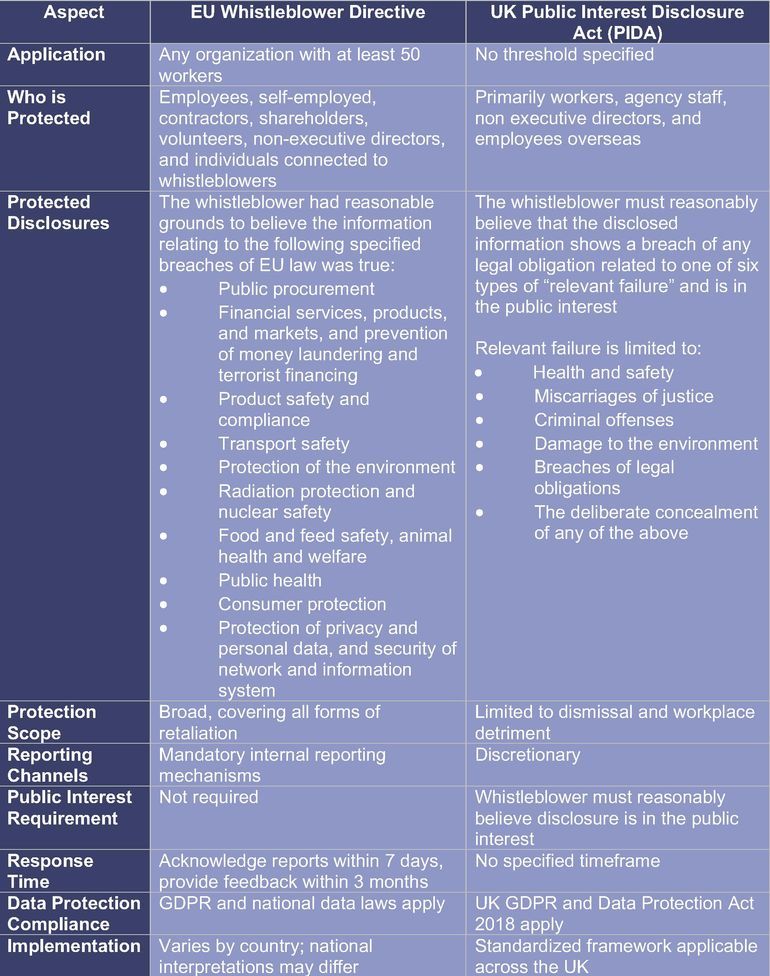Legal Update
Feb 4, 2025
Navigating Cross Border Whistleblower Investigations: A EU/UK Perspective
"The truth is rarely pure and never simple," said Oscar Wilde, and nowhere is this more evident than in the complex and ever-evolving world of whistleblowing investigations. In the wake of high-profile scandals and the #MeToo movement, companies must adapt to shifting legal and regulatory expectations, ensuring they handle whistleblowing reports effectively while mitigating risks.
The Growing Complexity of Whistleblower Investigations
From financial incentives to regulatory divergence, companies operating across jurisdictions face increasing challenges:
- Financial incentives: The US has long rewarded whistleblowers, and now jurisdictions like the UK and EU are considering similar schemes. While this can encourage disclosures, it also raises concerns about false claims and investigation management.
- Divergent UK & EU approaches: The EU Whistleblower Directive introduced minimum protections across member states, but national interpretations vary, creating compliance challenges for multinational companies.
UK vs. EU Whistleblower Protection: A Comparison
Both the UK and the EU provide protections for whistleblowers who report misconduct, such as sexual harassment and financial fraud. While the EU Directive aimed to create a harmonized system, its implementation has led to discrepancies across member states. Compliance in one member state does not guarantee compliance in another. Key differences exist in the regulatory approach of each jurisdiction with the EU setting minimum standards for member states.

Cross-Border Jurisdictional Risks
Companies operating in multiple jurisdictions face significant challenges due to the complexities of extraterritorial jurisdiction, inconsistent legal frameworks, and cross-border data sharing. These challenges create legal and compliance risks across regions:
1. Extraterritorial jurisdiction
- U.S. authorities often pursue extraterritorial claims. However, it’s more complicated for European regulators to assert jurisdiction over non-EU companies operating globally. This can lead to discrepancies in enforcement and create an uneven playing field.
2. Inconsistent legal protections
- Legal standards for whistleblower protection, data privacy, labor rights, and environmental regulations can vary significantly between jurisdictions. Companies risk violating the legal frameworks of one jurisdiction while trying to comply with those of another.
3. Cross-border data sharing and confidentiality issues
- Different jurisdictions have varying rules on data sharing, confidentiality, and the protection of sensitive information. For example, the US has broader data-sharing laws, while the EU has stricter standards under GDPR, which governs how personal data can be transferred across borders. A company based in the EU receiving a whistleblower report with sensitive personal data may breach GDPR rules if that data is forwarded to the US without proper safeguards.
Conducting Cross-Border Whistleblowing Investigations
To minimize risks across jurisdictions companies should consider:
1. Establishing clear whistleblowing procedures
A transparent and well-communicated process builds employee trust and ensures compliance. Best practices include:
- Promoting awareness of whistleblowing channels.
- Ensuring employees understand the reporting process.
- Implementing internal and external reporting channels.
- Offering anonymity options to encourage disclosures.
- Providing regular training for employees and leadership on whistleblowing.
2. Engaging with whistleblowers effectively
- Acknowledge reports promptly and provide regular updates while maintaining confidentiality.
- Comply with external reporting rules.
- Ensure whistleblowers feel protected from retaliation to minimize leaks.
3. Developing a risk-based investigation plan
Investigations should be proportionate to the severity of the allegations. Steps include:
- Clearly define the investigation scope and objectives.
- Identify any potential legal jurisdictional and practical challenges early.
- Develop jurisdiction-specific strategies.
- Assign clear roles, responsibilities, and deadlines within the investigation team.
- Document key decisions and rationale.
- Ensure compliance with domestic employment laws and company policies.
4. Assessing legal professional privilege
- Legal privilege varies across jurisdictions, affecting how companies handle internal investigations. Seeking early local legal advice can help protect communications and strategy.
5. Leveraging technology for compliance
Technology plays an increasing role in investigations. Companies should:
- Use AI-driven forensic tools to identify patterns in reports.
- Implement case management software to ensure consistency.
- Ensure compliance with GDPR and other data protection laws.
6. Interviewing
- Cultural and language barriers: Cultural sensitivity and linguistic accuracy are crucial. Engaging local HR or Compliance teams helps ensure effective communication and minimizes misunderstandings.
- Sensitivity and flexibility: Adapt language, interview skills, and interviewer selection to meet the nature of the complaint, and secure the best evidence.
Strengthening Whistleblower Frameworks to Mitigate Investigation Risks
Successfully handling cross-border whistleblower investigations requires careful preparation and strategic planning to navigate the legal, regulatory, and cultural complexities involved. Without a well-structured approach, companies risk falling into jurisdictional traps, such as conflicting legal requirements, data privacy breaches, or unintended retaliation claims.
Beyond legal compliance, robust whistleblower frameworks help foster a culture of integrity and accountability. Employees are more likely to report misconduct when they trust that investigations are conducted fairly and securely. By proactively addressing these challenges, companies can avoid costly missteps and conduct investigations with consistency and integrity.
